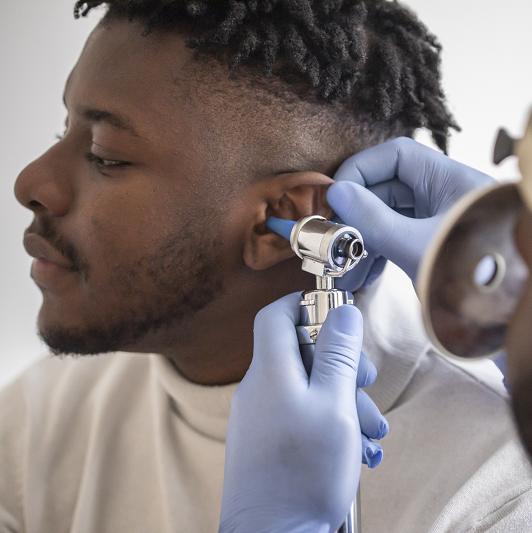Advice for Buying Hearing Aids

August 31, 2020
It seems today you can buy nearly anything on the Internet—including hearing aids. But, doing so may mean bypassing crucial parts of the diagnostic process, the hearing aid selection process and the counseling that is needed in order to correctly identify degree and nature of hearing loss and maximize the benefit from hearing aids.
According to a national survey conducted by the Hearing Industries Association, the number one reason most people buy hearing aids on the Internet is price. However, buying hearing aids on the Internet may save money up front, but that does not always result in buyers being satisfied with their ability to hear.
Steps to Purchase Hearing Aids
Diagnostic Process
If you have a sudden loss of hearing, particularly in one ear, seek immediate medical attention.
“Talk to your physician if difficulty hearing is interfering with your daily life,” shares Virginia Gural-Toth, Au.D., CCC/A, Manager of Audiology Services at the Center for Audiology at JFK Johnson Rehabilitation Institute. “Whether you’ve noticed it yourself and family or friends are making comments about your hearing, it is important not to delay having your hearing checked.”
According to Gural-Toth, the best option is to arrange an appointment for a hearing assessment by a qualified audiology professional which includes comprehensive hearing tests. Then, a professional can help you decide whether hearing aids or other technologies would help as well as making other recommendations to help you live well with hearing loss.
Hearing Aid Selection
The degree of your hearing loss will determine which styles may work best for you. The audiologist will also consider several factors when making decisions on hearing aid selection including:
- Lifestyle
- Personal preferences such as style and technology level
- Budget
Hearing Counseling
The Internet is a valuable resource to get information about hearing loss and hearing aids. However, when it comes to the actual diagnosis of hearing loss and/or the purchase of hearing aids, it should not replace testing in a sound treated booth by a certified licensed audiologist who also has a license to dispense hearing aids that can prescriptively fit hearing aids using sophisticated computer technology called real ear verification.
“Look for a center that uses state-of-art sound treated test environments to ensure accurate hearing tests as well as advanced computerized technology to verify hearing aid settings,” says Gural-Toth. “A variety of hearing aid manufacturers are offered to better meet your individual needs.”
Additionally, the expert shares that follow-up services are necessary to help you adjust to your hearing aid(s). “Your relationship with your audiologist doesn’t end once you walk out the door,” she adds. “You can expect to see them frequently—it can take a while to fine-tune your hearing aids to optimal settings and you’ll need to have your hearing tested annually.”
Risks of Buying Online
Due to the risks of buying hearing aids on the Internet, many hearing aid companies do not sell their hearing aids online and some have even placed notices on their websites warning buyers to have their hearing tested only from qualified professionals with the proper license and credentials.
These credentials are important to protect consumers from incorrect identification, as well as prevent purchases of hearing aids that consumers either do not need or may be wrong for their hearing loss.
In addition, omitting a hearing evaluation by a licensed audiologist can result in a missed diagnosis of the hearing loss or a serious underlying health condition. Some conditions include:
- Blockages in the outer ear
- Ear infections
- Head injury
When these conditions are identified, a referral is made to a physician for a follow-up.
Next Steps & Resources
- Meet our source: Virginia Gural-Toth, AuD, CCC-A, manager of Audiology, Tinnitus and Balance Programs at the Center for Audiology at JFK Johnson
- Find an audiology center near you.
The material provided through HealthU is intended to be used as general information only and should not replace the advice of your physician. Always consult your physician for individual care.






